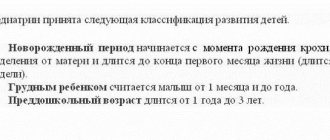Feeding at night does not allow the mother to properly rest and recover after a hard day. This can lead to chronic fatigue and other health problems. Therefore, many mothers have a question: up to what age does a child eat at night and how to properly wean him from snacking in the dark.
Until what age should a baby be fed at night?
After birth, children begin to actively develop and grow. In order for these processes to proceed normally, they need frequent nutrition. Newborns usually eat every 2-4 hours, including at night.
As you get older, the need for such frequent feeding decreases. The question of until what age does a child eat at night is relevant for all young parents.
It is difficult to give a definite answer, since much depends on the characteristics of the child’s body and the quality of the milk. During breastfeeding, the baby receives all the substances it needs for normal functioning and growth. Also, breastfeeding is the key to healthy psychological development of the baby.
During close physical contact with the mother, the child calms down and feels safe. You need to understand that a baby can ask for the breast not only when he is hungry . Children are drawn to their mother if they experience fear, loneliness, or cold. Since the nervous system is not yet fully formed, the baby is not able to differentiate the sources of discomfort.
The feeling of hunger is perceived by the baby as pain. To feed a newborn, the mother has to wake up several times a night. The older the child, the less often he asks to eat in the dark. By the age of six months, babies usually wake up 1-2 times.
Some pediatricians say that it is worth feeding infants up to three months 2-3 times at night, and 3-4 months - once; six-month-old children do not need snacks in the dark. But very few children fit into these rigid boundaries.
Breastfed babies may wake up every hour and fall asleep at the breast. Children receiving formula require food less often because the adapted nutrition takes longer to digest.
Until what age you should feed your baby depends on the following factors:
- qualitative characteristics of milk (the higher the fat content, the higher the degree of saturation);
- daily biorhythms of the child;
- degree of activity;
- character;
- appetite.
Night feeding increases lactation. If breast milk is not produced in sufficient quantities, experts recommend not replacing night feedings with water or formula.
How to painlessly wean your child from late-night snacking?
There are different ways to wean babies from night meals. The method for each child must be selected individually. It is recommended to take into account the type of feeding.
To wean a baby feeding on breast milk from feeding at night, the following methods are suitable:
- increase the time of tactile contact with the baby during the day. It is worth picking up a baby not only for feeding, but also for no reason. If a baby gets enough attention from his mother during the day, he will sleep better at night;
- feed the baby every other time at night. If the baby is crying, then you should rock him in the crib and sing a lullaby. It is advisable that the father or grandmother or grandfather approach the child in the dark. During the period of weaning from night feedings, it is better for mothers to sleep in another room so that the baby does not smell breast milk;
- increase the frequency of feedings during daylight hours. Children may get distracted during the day and forget that they are hungry. As a result, their night's sleep will be restless;
- change the eating conditions for the baby. You should not feed your baby in the crib in which he sleeps. The process of drinking milk in children is often associated with a specific place.
To wean off artificial night snacks, you must adhere to the following tips:
- Give your child enough food throughout the day. Feed him just before bedtime;
- if the baby wakes up in the middle of the night and is capricious, you should offer him a bottle of plain water and rock him in your arms;
- gradually reduce the amount of the adapted mixture in the feeding bottle in the dark;
- Give your baby a bottle of food every other night.
Many mothers start feeding their baby at night at the first cry. You need to understand that in addition to hunger, the baby may be worried about something else. The baby is probably crying due to colic and high fever. Therefore, you need to find out the reason for frequent awakenings at night and try to eliminate it.
Do I need to wake up my child?
Mothers worry about making sure their child is always fed and healthy. Some parents go to extremes and wake their baby at night to feed on a set schedule.
Pediatricians strongly advise against doing this. After all, the baby himself knows when he needs food. If the baby sleeps calmly and soundly, this means that he is full.
Forced awakening can negatively affect the baby’s nervous system and biorhythms. As a result, the baby will begin to sleep poorly, be agitated and capricious.
Should I wake up my baby for feeding?
It all depends on the child, his health and development, age, type of feeding. It is not advisable to interrupt a baby's sleep. Forced awakening can disrupt the psycho-emotional state and subsequently cause moodiness and insomnia. But there are a number of situations when it is necessary to interrupt sleep for feeding.
For example, if the baby is premature, grows poorly and gains weight, then it is necessary to wake him up to give him formula or breast milk. A long break from eating can negatively affect the health of the baby.
If the child is only 3-5 days old and sleeps for more than three hours at night, then it is worth consulting with a pediatrician. Such a long rest may be a sign of pathology. As you grow, the intervals between meals lengthen. By six months, many children sleep peacefully throughout the night and do not require food. This is a normal phenomenon, so you should not forcefully wake up your baby.
Another reason for the child’s forced awakening is low lactation in the mother. The hormone responsible for milk production is synthesized at night during feeding. In this case, forcing the baby to wake up will help the woman solve the problem of poor lactation.
If a baby needs to be woken up at night in order to feed it, then this must be done very carefully. It is important not to scare the baby. It is recommended to carefully pick up the baby and rock him. When the baby wakes up, you should offer him a breast or a bottle with an adapted formula.
How to wean your baby off night feeding?
The question of how to wean a child from night snacks is relevant for many families who are tired of constantly waking up during the rest period.
Knowing how to stop feeding in the dark is especially useful for mothers:
- who have older children who need attention and care;
- who plan to wean their baby in the near future;
- if the baby is already 6 months old.
It is important to approach solving this problem responsibly and carefully. If you suddenly stop feeding your baby at night, this can lead to problems with digestion and the nervous system. The baby should be prepared to avoid snacking in the dark.
The following signs indicate that you can wean your baby off night feeding:
- the child receives varied and nutritious complementary foods;
- the number of requests for a bottle with an adapted formula or breastfeeding at night has decreased;
- the baby is gaining weight normally;
- during the dark period of the day, the baby wakes up at the same time;
- The child does not eat the portion offered to him completely and is often distracted during feeding.
You should not deny your baby night snacks if he:
- sick;
- has a body weight below normal;
- is in a stressful state.
It is not recommended to stop feeding the child at night for those women who were forced to go to work before the baby turns six months old.
Prolactin, which is responsible for the production of milk, is synthesized in large quantities at night. Night feeding will help maintain a woman's lactation. Also, working mothers do not have the opportunity to give enough attention to their babies during the day. Night snacks for a child allow you to make up for the lack of care and affection from a loved one.
Secrets of weaning babies from feeding in the dark:
. It is important to ensure that the baby does not smell the breast at night. Therefore, you need to put him to sleep in a crib located away from his mother. If the baby is capricious, then you should ask the father to come to him and rock him to sleep. During the period of weaning from night feedings, it is better for the mother to sleep in another room. Instead of milk or an adapted formula, it is necessary to offer the child water;
for children 6-9 months of age- for babies 9-12 months . Pedagogical methods can already be applied to children of this age. Infants already partially understand simple speech addressed to them and intonation. It is necessary to explain to the baby that he needs to sleep at night, and during the day he needs to eat and stay awake. At the same time, you should talk to the baby affectionately, but confidently.
When weaning off nighttime snacking, it is strictly prohibited to use coercive methods, intimidate the child, ignore his crying, or take him to his grandparents. This can only lead to nervous disorders.
How and when to wean your baby off night feedings
05.08.2014
86
There is not a single mother who would not ask herself the question of how to wean her baby from nightly banquets. And is it necessary to do this: after all, if the baby wakes up, it means he is hungry, if he is hungry, he grows, and if he grows, he must eat... But children are actively growing up to the age of 18, so now why organize another (or more than one) late dinner for the next few years? a couple of decades??? Let's figure it out.
Assessing the situation
Before deciding that your child should be weaned from night feedings, you should definitely consult with your pediatrician.
On average, pediatricians say that many children are ready to sleep 11-12 hours without supplementation at the age of 6-9 months.
However, we are talking about healthy, well-developing children. Children who, for one reason or another, are underweight, are forced to eat smaller and more frequent portions - with such children, the opinion of the observing specialist is especially important!
The next step is to look at your baby's behavior during night feedings. Assess how and to what extent your child wakes up at night. If a baby is breastfed, does he actually eat? A baby who has woken up to feed is actively sucking and you may hear periodic swallowing. The duration of feeding, which is aimed at satisfying hunger, should be no shorter than 10-15 minutes. If the baby just gets sucked in for a couple of sips, and then quietly falls asleep, wakes up more than 1-2 times a night after reaching 6 months of age and his awakenings become more frequent in the morning - then it’s not a matter of hunger. Such a baby has formed a negative association between sleep and feeding, in other words, he does not know how to sleep without a breast, and that means it’s time to teach him this. And in the process, the baby himself will stop waking up at night.
If the baby is bottle-fed or drinks milk or water, then you can see huge amounts of liquid/formula that the baby consumes overnight.
Mothers with children came to me for consultations, drinking up to 1.5 liters of compote per night!!!
This seriously interferes with the restorative sleep of both the child and the mother (who still has to spend the whole day spinning around the house). Moreover, it puts a strain on the baby’s kidneys, urinary system and digestive tract, which need to rest at night. If you are familiar with this situation, then again it needs to be changed.
Another factor that often occurs in a situation where night feedings become intolerable is replacing daytime meals with nighttime ones. In other words, for various reasons, the child does not eat enough during the day and is forced to get the necessary calories at night. In this case, the mother urgently needs to work on identifying the reasons why the child is malnourished during the day, eliminating them and properly organizing the feeding regime - sleep will follow by itself.
Once you understand the reasons for frequent night snacking, you can properly build a plan to overcome it. And remember that not all adults can survive 12 hours without going to the refrigerator, so the last night feeding may well be delayed for up to 12 months.
Breastfed babies
For breastfed babies who have formed an association between feeding and falling asleep (the norm for up to 4 months, but not for older babies), it is important to understand that they themselves can fall asleep perfectly without the help of their mother’s “magic” nipple. To do this, separate the process of laying down and feeding so that the baby does not fall asleep on the chest, for example, feed, change the diaper, and then put him to bed. Your task is to ensure that the baby, after eating, falls asleep on his own. For night feedings, turn on a dim night light to make it clear that eating and sleeping occur in separate environments, and if possible, do not feed in the sleeping area at all. If the baby is still small, and you understand that he needs one or two feedings, but the existing six are already too much, then determine the time at which you are ready to feed fully.
I recommend no earlier than 12 at night and no later than 5 in the morning, and on other awakenings, offer water from a sippy cup (not from a bottle with a nipple!).
Alternatively, you can gradually reduce the duration of feedings at odd times, but in practice this is not very effective. And don’t rush to run to a baby over 5 months old at the first squeak; it’s very possible that you yourself will wake up the baby who just whimpered in his sleep, wait a few minutes. Usually, if the mother is committed to the result, then it will be visible within a couple of nights, although they may not be easy. However, remember, just as food is nutrition for the body, sleep is nutrition for the brain and its importance is in no way inferior to food. And the more restful night's sleep you'll get in just a few days is well worth the effort.
Formula-fed babies
Formula-fed babies often, contrary to popular belief, sleep no better than breastfed babies. And this is just confirmation that it is not only hunger that wakes children up at night. Moreover, for formula-fed babies it is especially important to follow a feeding schedule so as not to overload the digestive system with a slower-absorbing mixture. Again, decide how many feedings your baby needs. With the remaining feedings, you can reduce the amount of formula in the bottle by 20-30 grams each night until you reach 30-50 grams, at which point you simply stop offering food if baby is still waking up.
Alternatively, you can gradually dilute the mixture in a larger proportion with water until you reach water - the children themselves refuse such a “delicacy”.
If your age allows, ditch the bottle and switch to a sippy cup with a soft spout.
“Adult” children after 18 months
If your child has already grown up, but still endlessly drinks water, tea, milk, compote at night, then you are dealing with a negative association, the nature of which I described above. More often, such babies drink from a bottle and the focus of their awakenings is not in thirst, but in the nipple. Sucking the pacifier reproduces to some extent sucking the breast and powerfully helps to relax to the extent that babies get used to relaxing into sleep only this way. The first thing you need to do is replace the bottle with a sippy cup; its spout is very different from the nipple and for many babies this is enough to stop “wanting” to drink at night. If you serve compote or tea, then it makes sense to dilute them a little. This way you will reduce the amount of sugar, which is harmful to very delicate teeth. When it comes to older babies, it is worth placing a sippy cup next to the crib and explaining that they themselves can reach it and drink if necessary.
Finally
It can be difficult for a mother to decide to wean a child from night feedings, who just a few months ago could not live even a couple of hours without food. From my own experience, I can say that children grow faster than we have time to adapt and accept their new skills and capabilities. And in such cases, it is more difficult for the mother to wean herself off night feedings, and not for her beloved treasure. However, it is important to remember that full and healthy sleep is the basis for the successful development of every baby, and we simply do not have the right to slow down this development with our fears. And if your conscience suddenly begins to gnaw at you because you are “tormenting your child in order to sleep yourself,” know that you are working on establishing a healthy sleep schedule and, yes, a rested mother is always more affectionate, kinder and more attentive to both the child and the father, which in itself is already a lot.
Comprehensive work on baby's sleep
THE PACKAGE IS SOUND
individual support from a specialist
More details
Have a healthy rest, share your thoughts in the comments and subscribe to the newsletter, our team consultants are always happy to help you.
Did you like the article? Rate:
Votes: 186











